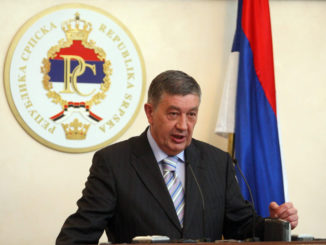
Brussels — Johannes Hahn, the EU’s neighborhood and enlargement negotiations commissioner-designate, says Serbia needs to carefully consider its refusal to support EU sanctions against Russia if Belgrade hopes to join the European Union.
Hahn made the remarks to the European Parliament during a September 30 hearing on whether to confirm his appointment as enlargement commissioner.
Hahn told the European lawmakers that if Belgrade “is moving towards accession, the signal will have to be the right one” on sanctions against Russia.
Hahn said there won’t be any EU enlargement during his five-year mandate if he becomes the EU commissioner responsible for the portfolio.
Those remarks echoed statements by EU Commission President Jean-Claude Juncker, who has said that no new country will join the European Union during the current decade.
But Hahn said the enlargement process wouldn’t be at a standstill under his mandate because negotiations would continue with countries in the Western Balkans like Serbia and Montenegro.
In his assessment of the challenges facing other Western Balkan countries that hope to join the EU, Hahn said the EU needs to change from its current “Dayton logic to a Brussels logic” to overcome the standstill on Bosnia-Herzegovina.
He also said that he would travel to Bosnia, if confirmed as a commissioner, in order to investigate the problems that have delayed progress on reforms in the country.
On Kosovo, Hahn said he hopes political dialogue between Belgrade and Pristina will continue.
He also noted that the five EU states which have not recognized Kosovo’s independence have shown “some movement” on the issue.
Hahn said one of Macedonia’s main challenges on opening accession negotiations is opposition from Greece over the name “Macedonia.”
Macedonia has been an official candidate country since 2005 but has not yet entered into accession negotiations, mainly because of opposition from Greece.
Hahn said the name dispute with Greece, an EU member state, has dampened the appetite for other reforms by Skopje — despite the government’s position that accession to the EU is the country’s highest strategic priority.
But Hahn added that it is necessary to get a mandate from all EU member states in order to begin accession negotiations with Macedonia.
On Ukraine, Hahn said he would do everything in his power as an EU commissioner to contribute to a solution to the country’s separatist crisis.
Amid increasing evidence of direct Russian military involvement in Ukrainian territory, Hahn said Ukraine’s territorial integrity, sovereignty, and independence should be respected.
He said the EU will assist with issues such as decentralization of the government, stabilization of civil society, and the reconstruction of eastern Ukraine.
Speaking about the Deep and Comprehensive Free-Trade Agreement, implementation of which was postponed to January 2016, he assured that the EU will maintain the agreement as it has been agreed to by Kyiv and Brussels.
Hahn also said the EU should help Ukraine on energy issues, but he said Ukraine’s energy sector needs to become more transparent.(With reporting by RFE/RL’s Rikard Jozwiak in Brussels)


